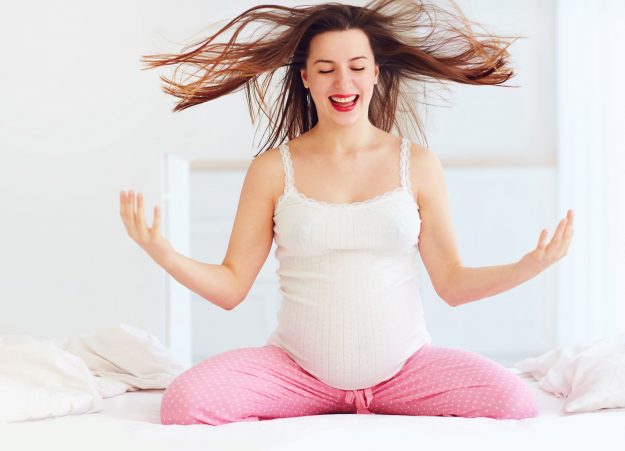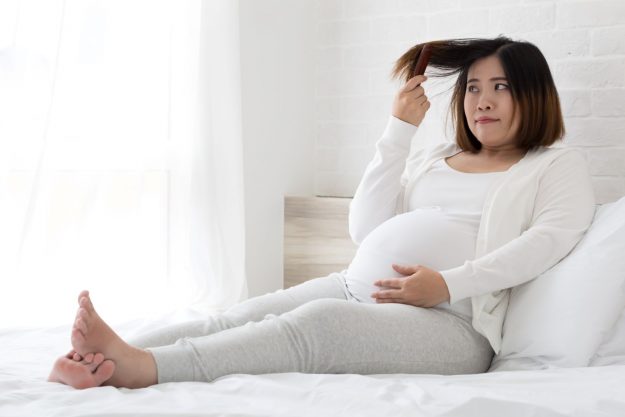
Natural changes in their hair are among the many things that women are excited about when it comes to pregnancy. While pregnant, a lot of women boast lush and fast-growing hair that’s in its best condition yet. The reason for this has a lot to do with all the hormonal changes you experience when you’re expecting.
Rather than shedding hair as you normally would, the extra hormones help your hair stay where they are, which is why your hair seems longer and thicker than usual.
So during that time when your hair’s thriving, it makes sense for you to savor the moment and enjoy your crowning glory before hair loss starts to happen post-pregnancy. However, even with such positive changes, you’re not supposed to stop taking care of your hair. You still need to be on the safe side, so you have to know what pregnant women should and shouldn’t do to their hair.
If you’re expecting, keep reading to discover some of the important things you have to be aware of about pregnancy hair care.
1. Your Usual Hair Products Are Generally Fine

Staying away from chemical hair treatments doesn’t mean you should change your usual shampoo, conditioner, and other hair products as well. If you want to take it one step further by opting for natural products like a gentle shampoo for sensitive scalp, then that’s a good route to take. However, the products you’ve been using since before you became pregnant will work just fine.
You might only have to switch out your hair care products if you’re using a prescription anti-dandruff shampoo or prescription cortisone shampoo. Ask your obstetrician-gynecologist (OB-GYN) if either of those is safe for you while you’re pregnant.
2. You Should Avoid Chemicals If You Can

If you’re the type who regularly gets hair treatments, you may want to take a break from them during your pregnancy. There are a lot of conflicting opinions about this since some doctors don’t have a problem with pregnant women using hair dye and similar products while others don't recommend it. The rationale of those who are against chemical hair treatments during pregnancy is that some of those chemicals may easily get absorbed into your scalp and then passed on to your baby.
So it really boils down to your preference and what your doctor says. Either way, it’s only nine months of not having any hair treatment done. If you can temporarily avoid unnecessary chemicals, then do so. It’s better to be safe than sorry.
The chemical hair treatments in question include the following:
- Relaxers, which usually contain sodium peroxide to permanently straighten the hair
- Coloring, including permanent and temporary hair dyes alike
- Bleaching using hydrogen peroxide
If you’re reluctant about steering clear of such options, just think of it this way: you’ll be allowing your hair to rest and recover from all the treatments it regularly undergoes. You can give your hair some time to breathe and be healthier.
3. A Hair Oil Massage Is A Good Idea
As you temporarily let go of the hair treatments you’re used to having, what you can do instead is to give your hair an oil massage. You can use natural oils for this such as coconut, almond, and castor oil.
You can consider the hair massage as part of your ‘me time,’ and it’s something you can do twice or thrice a week. It can improve blood circulation in the scalp, and as a result, your hair becomes stronger, softer, and shinier.
4. Eating Right Benefits Your Hair

When you’re pregnant, it’s already expected that you’re going to eat right for your and your baby’s health. But doing so can also help nourish your hair as it’ll be able to get the nutrients it needs to grow well.
For example, if you want to take extra care of your hair follicles, a diet rich in eggs, fish, flax seeds, and fish will make them strong and healthy.
5. It Is Advisable To Keep Your Hair Trimmed
Regular hair trimming is the best and easiest thing you can do to prevent damaged edges and split ends. When done at fixed intervals, it's enough to prevent hair thinning and breakage. In effect, your hair will start to look and feel healthier.
As an added precaution, you may want to avoid combing your hair when it’s wet. That’s only acceptable if you have a wide-toothed comb that can accommodate the thicker hair you now have. Otherwise, you could just be damaging your hair when you comb it while it's not yet completely dry.
Conclusion
As women who’ve been pregnant before would say, enjoy your pregnancy hair while it’s there. It’s not going to last very long because during the first few postpartum months, you may experience hair shedding or hair loss. While pregnant, remember everything that’s been discussed above so you can make the most of your long, healthy, and lush hair.
Read Next:
